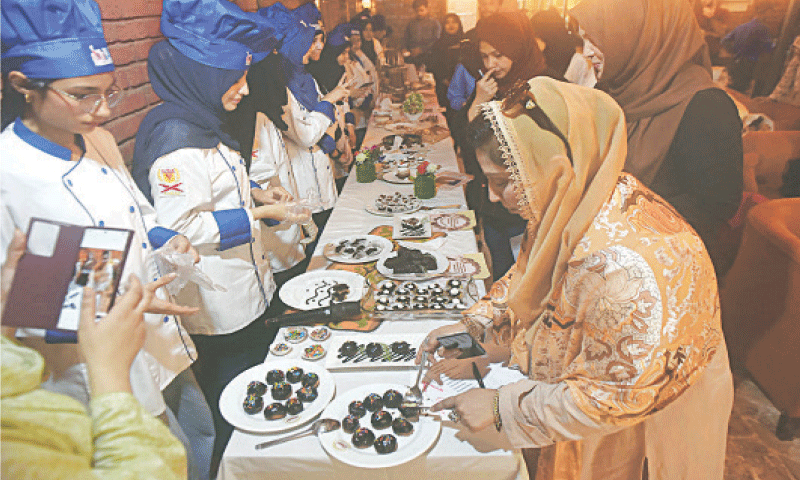The Covid-19 pandemic and the rise of the home chef
"I started baking as a child to help my grandmother and mother,” says Eesha Hussain, founder of Batter & Dough. “Professionally, I’m a bachelors in marketing and brand communications, and have worked in various ad and media agencies for nearly six years. I enjoyed baking and found it therapeutic, but I never imagined it to be a career. It was only when I realised I preferred being in the kitchen and experimenting with recipes, as opposed to working at a desk, that I decided to take a risk and give professional baking a shot.”
Batter & Dough currently has over eight thousand followers on Instagram, with many of their mini-cupcakes, brownies, cakes and other confections being sold out as soon as they are offered online.
Last year, the Covid-19 lockdown and resultant governmental policies led to indoor dining restrictions. Inevitably, the gap created by the absence of restaurants was filled with takeaways and home deliveries, as people tried to satisfy their desire to eat out. Various home chefs flourished where restaurants lagged, with some even having a sales boom in 2020.
A home chef is a small, home-based business, often run by women who find it convenient to prepare and dispatch freshly cooked food from their homes, for pick-up or delivery to customers’ homes. These businesses have gained popularity over the last few years via word of mouth, through social media and, now, through delivery services.
Nadia Moqeet Khan, who runs My Spicy Kitchen by Nadia, and Lailumah Shah, owner of Deli-Cious by Lailumah, both acknowledge that their entry into the home chef business started off as a hobby, but that with support from family and friends, they eventually turned their hobbies into a profession.
It helps that the start-up capital is low. “I started off with one oven and a mixer and, eventually, as the business grew, I started adding more tools and equipment, and even hired some helpers,” says Eesha. Nadia began her business with a mere 3,000 rupees. “I accumulated my capital as my business grew, and thankfully, it paid off,” she says. Lailumah’s story is similar. “I started off by making stuffed bread in my kitchen,” she says. “It was convenient, and something new, plus I didn’t have much to lose if it didn’t work out. I’m glad it did.”
“We have over a hundred chefs on our platform,” says Shahryar Khan, the vice president marketing at Homechef.pk, which operates its platform out of Karachi. “We have over twenty cuisines being cooked — from Japanese to Hyderabadi — by authentic chefs who have a passion for cooking.”
The biggest adversity last year was, of course, Covid-19, which threatened to wipe out even well-established restaurants, let alone home-based businesses. “There was a delivery ban for the first month of the lockdown, which led to our worst month in history,” says Shahryar. “We soon recovered with the allowance for home delivery, but the rains that followed proved an additional detriment to our comeback.
“Even more difficult was the disappearance of ‘lunch time’ — offices were shut, people were working from homes, indulging in late breakfasts, early dinners, no proper lunches. This led to a significant drop in our office meal plans businesses.”
Dessert businesses such as Batter & Dough were also adversely affected during this time. “There was a drastic dip in sales,” says Eesha. “I think everyone was figuring out whether it’s safe to order from outside, and all celebrations came to a stop.”
Many businesses had to lower their cost to continue working. “I was out of business for months as we had no orders,” says Nadia. “Some businesses, even established ones, had to let go of their employees at the time.” In contrast to those left without orders, Lailumah’s business had itself stopped taking orders. “I’ve been selling food for eight years but, this time, it didn’t feel safe to risk my own health and my family’s by taking orders,” she says. “So I paused everything until May.”

With time though, the situation improved. Interestingly, some well-established restaurants may have shut down because of Covid-19, but eventually the lockdown became a blessing in disguise for home chefs. People still couldn’t go out to eat but they could order in instead.
Some home chef businesses even profited. “We capitalised by pushing more dinner meals and snacking options,” Shahryar says. “Various chefs selling regular home-cooked food like daal and mixed sabzi [vegetables] actually prospered. Our reading is that, typically, people would be looking at more eclectic options to order in, but with the ‘new normal’, everything has changed.”
People now often opt less for domestic help, as they cook more with more family members continually at home and, therefore, are looking to order more for regular meals. “That can explain why various home chefs have prospered,” says Shahryar as he points to a chart on the screen. “In December 2020, we did more than twice the business we were doing at the start of the year. We expect the demand to continue significantly, as more people indulge in increased meals and snacks, and continue to outsource their kitchen.”
Apparently businesses that sell snacks and more of everyday food items have flourished, compared to chefs selling desserts and less-traditional cuisines. “There’s a huge demand for desserts for smaller gatherings and for gifts and giveaways as people shift to smaller celebrations,” Eesha says. “But orders for bigger events are still nearly non-existent.”
At the moment, there is a lot of anxiety among some home chefs over what lies ahead. “The situation changes constantly,” says Eesha. “And so do the government regulations. There’s also a risk of infection among our own team, so that makes planning and taking orders nearly impossible. Every time one of my team members or I am exposed to someone who might later test positive, we have to quarantine ourselves till we are clear, which means cancelling orders and shutting down shop for a few days.”
Some home chefs, such as Lailumah, prefer to cook alone. “I don’t hire help at all,” she says. “In the rare instance that I do, it’s only to wash the dishes or clean the kitchen. Staff hasn’t been a problem for me.”
“In the last nine months, I’ve had to find new accommodation for part-time staff to minimise the risk of infection,” says Eesha. “Many left, others were let go. I think I’ve hired and retrained staff six times in the past year.”
With the on-and-off flight restrictions, and ongoing lockdowns in other countries, many ingredients for non-Pakistani food are often unavailable for weeks, even months. Those that are available have had a price spike because of the increased cost. “As I have a home-based business, there’s very limited space for stock, so I constantly have to tick things off the menu and back because of the unavailability of ingredients,” says Nadia. “Thankfully, the situation seems to be getting better, so I hope the uncertainty will be replaced with clarity.”
An upside of Covid-19 is a vast increase in hygiene standards being followed. “We train all our partner chefs and delivery teams on food safety and hygiene, on how to prepare ingredients and deliver food in a clean and safe environment,” says Shahryar. “Our apps are available to encourage ratings and reviews — this way new customers know what to expect while ordering from us.”
Despite the anxiety and the continuing global pandemic, home chefs do look at the present year with cautious hope. “We had many challenges over the past year, but we overcame them,” says Nadia. She looks tired, but determined, even enthusiastic about what lies ahead. “It can only get better from here.”
The writer is a freelance contributor and can be reached at mehreennaveed2009@hotmail.com
Originally published in Dawn, EOS, February 14th, 2021











Comments